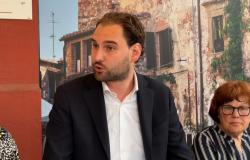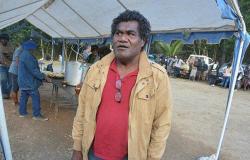33%. This is the final score obtained by the National Rally at the end of the European elections. That is eleven points more than in 2019. Historically, Alsace has always voted right. Particularly in the countryside. “Many people are voting for the extreme right in the countryside today, especially among the working classes,” observes Fanny Hugues, a doctoral student in sociology at the Center for the Study of Social Movements (CEMS).
« If the benefits they have such as the RSA, the energy check, the renovation aid are weakened by the government, and in addition to that at the local level, these people feel affected in their social, material and symbolic position, perhaps all of this works in favor of the RN”, analysis Fanny Hugues.
Raising awareness about voting in neighborhoods
Only two cities are doing well: Strasbourg and Mulhouse. Manon Aubry, head of the list of La France Insoumise (LFI), achieved very high scores in certain working-class neighborhoods, exceeding 60% in several sectors of Hautepierre and Cronenbourg in Bas-Rhin. Not enough to win.
To try to counter this historical anchoring, several local initiatives are emerging. At 39, Ahmed is the representative of the Alsatian branch of the Ma Cité Va Voter collective. A group of personalities from the associative world, whose objective is to raise awareness among citizens, mainly from neighborhoods, to take part in elections.
In the Wagner estate where he grew up, numerous local actions are being implemented, with the legislative elections of June 30 and July 7 in sight. “Before each activity, whether it’s homework help or even sports, we take a moment to raise awareness about the importance of getting involved in the legislative elections,” he congratulates himself.
Lack of knowledge of electoral procedures
For the Alsatian branch, raising awareness on the ground also involves popularizing a whole vocabulary considered complex by some residents. “Today, how do you want to explain to a young person from the city what a constituency is? There is a whole vocabulary that needs to be made simpler,” adds the Mulhouse volunteer.
“We, politics, are something that we have neglected for several years”he regrets. On Sunday, when we went around the neighborhood, the answers were along these lines. “Some didn’t even know there were elections, others didn’t want to hear anything. » And for good reason, nearly 47% of Alsatians decided to boycott the vote this Sunday. With a rate rising to 54.9% in Mulhouse.
It was a pain for young people to go to the police station to make their proxy in relation to all the questions surrounding the youth-police relationship.
Beyond a lack of knowledge of electoral procedures, this abstention may be the consequence of a distrust of institutions, according to Ahmed. “It was difficult for young people to go to the police station to make their proxy in relation to all the questions surrounding the youth-police relationship. »
Regional issues
According to a study by IPSOS, inflation, poverty, medical deserts, and education are among the major concerns of French citizens. Problems encountered by residents of working-class neighborhoods. “Your range of possibilities is quickly limited if you are not curious. Even in terms of transport, it is very poorly served,” confides Ahmed.
Between associations, we talk about our struggles. Whether in the north or in the south, it’s the same thing
The collective born in Garges-lès-Gonesse in the Parisian suburbs extends all over France, from Marseille to Perpignan, via Mulhouse. A desire for Hind, initiator of the collective, not to essentialize the fight to the Île-de-France. “Between associations, we relate our struggles. Whether in the north or in the south, it’s the same thing. It’s even worse in rural areas compared to the Paris region,” she says.
Rural areas, neighborhoods, same “galleys”
Activists from the Ma Cité Va Vote collective wish to extend their struggle beyond regions and neighborhoods. “We are aware of the difficulties that bind us to rurality, namely precariousness. Precariousness does not only concern Arabs and blacks. We are all concerned,” admits Hind, initiator of the collective. “Sometimes it’s just 10 miles that separate us. In the end, there are more things that unite us than divide us,” Ahmed emphasizes.
Starting with similar lifestyles, sustainable in the long term thanks to non-monetary resources such as « mutual aid, vegetable gardening, exchanging, repairing »Low consumption practices, weakened, which endanger the social position of rural dwellers, according to Fanny Hugues, sociologist, author of the thesis “Living on little in rural areas”. “When there are new residents, who make money or often work in the city, there is a fear that exchanges, in this case non-monetary, will no longer work. »
Read also. National Rally: “Normalization is not an inevitable process”
These fears are also shared in some neighborhoods. “where businesses change and rent prices increase are also weakened.” The very strong distrust towards economic and political elites could arise from insecurity in their own position, according to the sociologist. “It is enough for certain policies to be put in place to destabilize these lifestyles, and which do not correspond to people in rural areas, for there to be a loss of recognition at the local level,” specifies Fanny Hugues.
Meet to burst the abscess
But not only. The countryside and neighborhoods are subject to constant stereotypes on both sides. “On both sides, there is a lot of class contempt. As for the rural people, they are not racist, but classist; they are traditionalists.” Likewise in their speeches, where working-class neighborhoods are made invisible. “When people in the countryside talk about big cities, they systematically associate them with something that is expensive and difficult to get to. Those who are singled out are the rich. We don’t talk about the neighborhoods,” adds Fanny Hugues.
The idea is to reconcile, to tell each other about our respective struggles.
So, to bring neighborhoods and rural areas closer together, the Ma cité va voix collective will soon launch its “Reconciliation” project. The idea is to meet rural residents, accompanied by young people, to learn more about the conditions in which each person lives on a daily basis. “The idea is to reconcile, to tell each other about our respective struggles”explains Hind. “There is this reflection of saying “come, see you. We know your difficulties, because we share the same ones. We know that you too, the end of the month usually happens on the 15th.” adds Ahmed.
Meet and discuss to identify common difficulties. But also, deconstructing an imagination built by the political discourses of the extreme right, Hind is indignant. “In reality, the farmer, if he manages to fill his fridge, he doesn’t care about people with immigrant backgrounds. »
Coralie Chovino






